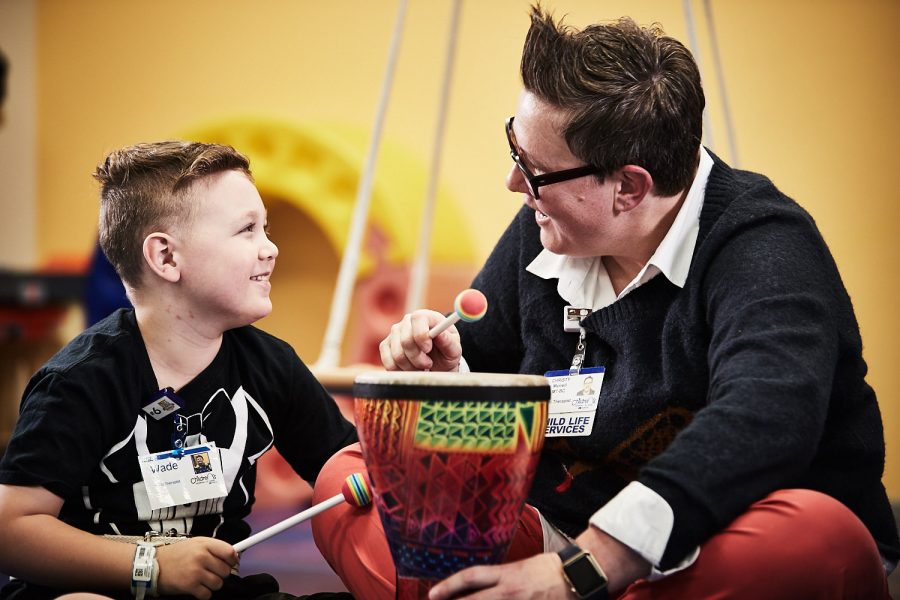Your donation will support the student journalists of Francis Howell North High School. Your contribution will allow us to purchase equipment and cover our annual website hosting costs.
Normalcy in an Abnormal Environment
Published: April 3, 2019
Laughter. The sounds of children socializing as they create artistic masterpieces come from one side of a colorful hallway. Music. The sounds of a young man singing his heart outcomes from the opposite side of the colorful hallway. Light. The light from a rooftop garden comes from the large glass doors. These elements all converge in that one colorful hallway, a place where all worries seem to fade away.
The lights in the Child Life Playroom at St. Louis Children’s Hospital (SLCH) are dimmed to a relaxing level as the children finish an art project. This is just one of the many activities that bring kids and teens laughter during their time at SLCH, and it is run by a special department at the hospital called Child Life Services (CLS). This department, as CLS Supervisor Tyler Robertson puts it, promotes a change in perception on extended stays in a hospital for both the patients and their families.
“It has had a tremendous impact on the way families view hospitalization,” Robertson said. “The child life specialists provide education. They provide coping skills. They provide things that just help to continue a child’s development.”
Among those resources, CLS provides is a school program for children who are missing school because of their illness. The CLS School Program is made up of school teachers who will assist kids in whatever school work they may be missing. They will help to modify study habits if their illness has caused them to need an alternative education plan, and they even help schools determine what might need to be permanently different due to a severe illness. School Program Teacher Linn Casper believes this to be a vital role in patient care due to its commitment to maintaining consistency in the lives of their patients.
“We are a big piece of these patients feeling like a normal and typical kid whose life isn’t going to be set back because of their illness,” Casper said. “It keeps them connected to their real life.”
Keeping kids tied to their normal life is one of the purposes of CLS. Another purpose lies in the various facilities sprinkled throughout the hospital. They have various playrooms for patients of any age, and there is a large teen lounge for teenagers and adolescents who are spending an extended amount of time at the hospital. There is also a rooftop garden for patients and families to enjoy during their time at SLCH. These facilities provide patients and families a chance to escape the medical setting and relax.
“By giving children these coping skills and opportunities to play, we can help minimize the negative stressors that come from being in the hospital,” Robertson said.
Ensuring a sense of normalcy and providing coping skills for long term hospitalization are what CLS focuses their attention on. The ways in which they employ this mission is dependent on the needs of the kid. Regardless of the patient’s medical condition, however, the CLS team dedicates their efforts to ensure the mental, physical, and social development of the patients of SLCH in order to make them feel at ease in a medical setting.
“If you think of a child’s development as a ladder, our team helps them get to that next level, whatever that may be,” Robertson said. “Child Life Specialists really gives these kids a chance to be a part of their care, rather than a recipient of it.”

